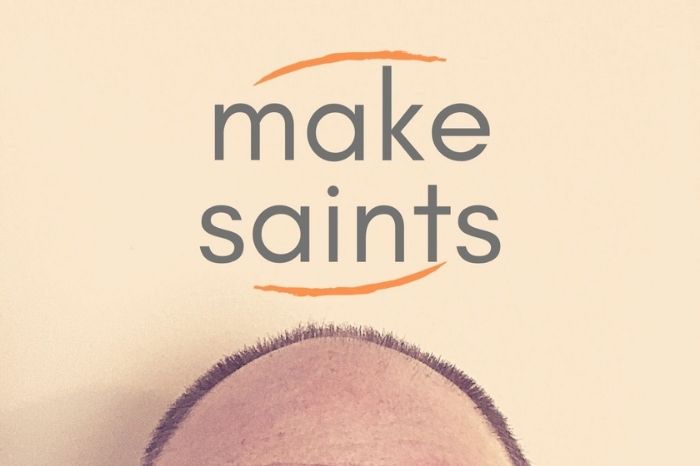Episode 7 of the Make Saints podcast.
These days, celebrating Thanksgiving is pretty meta.
The holiday is supposed to be about giving thanks as the Pilgrims did that one time with a grand feast of local cuisine with the indigenous people who lived there. Of course, the myth is certainly rosier than the truth. And we know that makes the celebration a bit uncomfortable.
So we shift our attention to the more general concept of thankfulness.
It is also a national holiday, so here we are, preparing to celebrate this feast, loaded with tradition (and carbohydrates) with a founding myth that is hard to swallow and governing ideology which is far more palatable.
In other words, we’re trying to make do with the hand we’ve been dealt and make it through this. To survive it. We’re all embodying the founding myth’s metaphor.
Of course, the myth begat ideology.
The holiday we call Thanksgiving here in the US is not about reenacting the founding myth. It’s about the ideology of remembering this one time to be thankful. At least, that’s what we keep telling ourselves.
It is also pretty telling that “dealing with the crazy uncle” is an idea that has become so rooted in the public perception of the holiday. So we are given strategies for, not only how to deal with him, but even to give thanks for family in spite of the inevitable carnage.
While I may have a few crazy uncles, they are delightful dinner guests. And let’s be honest, I might be the crazy uncle others have to deal with.
Of course, the problem isn’t uncles.
It’s the challenge of family and how intimate we’re willing to be with each other.
Which is also why the founding myth can’t really die in the public imagination.
Both of them deal with truth we desire to keep hidden. An apocalypse we hope to prevent.
Apocalyptic Joy
And yet, if we think about holiday movies – not the overtly Christmas fair, but the ones that take place around tables of people eating with loved ones from out-of-town – we can see just how rarely they are rosy and happy times of constant merriment and peace.
No, they’re train-wrecked disasters. And we eat them up. We start feasting on this fair the second leaves turn colors or Halloween is in the rearview.
What we want is carnage. Not because we love the destruction. But because we think that is more real.
I have a loving and intimate family, but it isn’t perfect. And I know we’re talking about how /not/ perfect that family feast was.
And yet, we get together, not to have that idyllic feast, but to have the potential intimacy the holiday promises. We want the joy of being seen and known and loved by other humans. Not just the ones we see everyday.
I can be snarky about the idea of having to be thankful only one day a year, rather than the other 364. But I still feel drawn to it. To imposing thankfulness upon myself. Demanding it of my loved ones. That we’re all going to sit down, shut up about the junk we’re mad about, eat this ridiculous dinner that I’ve put way too much effort and anxiety into, and we’re all going to like, darn it. We’re going to like being together and we’re going to be thankful for it. Why? Because it’s good for us!
Giving thanks is the first generous gift.
I’m not big on thank you cards. Showing thanks is not something I’m really very good at. I’m aloof and cerebral and always thinking big thoughts. But I am good at being thankful. And it seems to me that the thing we’re all avoiding – the apocalyptic intimacy we all crave but refuse to name – is rooted in the same fears that stunt our relationships, commitments, and ability to participate in loving partnerships.
Which isn’t just about us, is it?
If none of us is very good at being that kind of honest in our relationships, we can totally see how we are trash at running a city, state, or country. Why we see such inequality in our world and feel disempowered from doing anything about it. And then, ultimately, why we avoid thinking about the history behind our founding myths.
It may not seem like the perfect thing to talk about over the Thanksgiving table, but revealing the truth to one another about our founding myth and what perpetuating does to us is probably a healthy thing to do. That is, if intimacy and health is valuable to the family rather than placid acceptance.
Of course, this isn’t a license to ruin Thanksgiving with diatribes and rigid certainty. But making room for honesty by naming that which we refuse to name: opening the door to a possible, more intimate future.
That perhaps, that founding myth of generosity, without the destructive exploitation by the settlers, continues to hide our destructive tendencies. And if we are willing, we can admit the generosity of the native peoples and the selfishness of the settlers can show us where truth thankfulness can lie for us, wounded and weary saints: in the generosity of people way healthier than we are.
And that we may be empowered to see the saintly in them.
Happy Thanksgiving.
